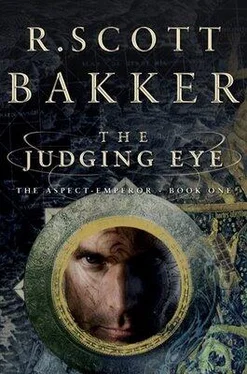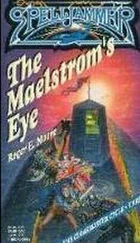R. Bakker - The Judging eye
Здесь есть возможность читать онлайн «R. Bakker - The Judging eye» весь текст электронной книги совершенно бесплатно (целиком полную версию без сокращений). В некоторых случаях можно слушать аудио, скачать через торрент в формате fb2 и присутствует краткое содержание. Жанр: Фэнтези, на английском языке. Описание произведения, (предисловие) а так же отзывы посетителей доступны на портале библиотеки ЛибКат.
- Название:The Judging eye
- Автор:
- Жанр:
- Год:неизвестен
- ISBN:нет данных
- Рейтинг книги:5 / 5. Голосов: 1
-
Избранное:Добавить в избранное
- Отзывы:
-
Ваша оценка:
- 100
- 1
- 2
- 3
- 4
- 5
The Judging eye: краткое содержание, описание и аннотация
Предлагаем к чтению аннотацию, описание, краткое содержание или предисловие (зависит от того, что написал сам автор книги «The Judging eye»). Если вы не нашли необходимую информацию о книге — напишите в комментариях, мы постараемся отыскать её.
The Judging eye — читать онлайн бесплатно полную книгу (весь текст) целиком
Ниже представлен текст книги, разбитый по страницам. Система сохранения места последней прочитанной страницы, позволяет с удобством читать онлайн бесплатно книгу «The Judging eye», без необходимости каждый раз заново искать на чём Вы остановились. Поставьте закладку, и сможете в любой момент перейти на страницу, на которой закончили чтение.
Интервал:
Закладка:
"Is it true, what they say, that witches are no longer burned?"
"Yes. There's even a new School."
He does not like the way she says that word, "School." She can see it in his eyes.
"A School? A School of witches?"
"They're calling themselves the Swayal Compact."
"Then what need do you have of me?"
"My mother will not allow it. And the Swayali will not risk her Imperial displeasure. Sorcery, she says, leaves only scars."
"She's right."
"But what if scars are all you have?"
This, at least, gives him pause. She expects him to ask the obvious question, but his curiosity seems bent in a different direction.
"Power," he says, glaring at her with an intensity she does not like. "Is that it? You want to feel the world crumble beneath the weight of your voice."
She knows this game. "Was that how it was for you in the beginning?"
His glare seems to falter over some inner fact. But it means less than nothing, winning arguments. The same as with her mother.
"Go home," he says. "I would sooner be your father than your teacher."
There is set manner to the way he turns his back this time, one that tells her that no words can retrieve him. The sun pulls his shadow long and profound. He walks with a stoop that says he has long outlived the age of bargaining. But she hears it all the same, the peculiar pause of legend becoming actuality, the sound of the crazed and disjoint seams of the world falling flush.
He is the Great Teacher, the one who raised the Aspect-Emperor to the heights of godhead. Despite his words to the contrary.
He is Drusas Achamian.
That night she builds a bonfire not because she means to, but because she cannot overcome the urge to burn down the Wizard's tower. Since this is impossible, she begins-quite without thinking-to burn it in effigy. After throwing each hewn branch, she stands so that the walls appear to rise miniature from the crackling incandescence, crouching just enough for the flames to garland the little window where she thinks he sleeps.
When she's finished, she stands in its blazing presence, takes comfort in the stink of her exertions, and tells herself the fire is in fact a living thing. She does this quite often: pretends that worldly things are magic, even though she knows otherwise. It reminds her that sorcery is something she can see.
That she is a witch.
She scarcely notices the first drops of rain. The fire seems to beat them into steam, to lap them from her clothing and skin with invisible tongues. Lightning flashes, so bright the flames become momentarily invisible. Then the black heavens open up. The surrounding forest lets loose a vast white roar.
For a time she crouches against the downpour, her leather hood hitched over her head, the fire spitting and steaming immediately before her. The water sends long tendrils through the crease and seam of her cloak, cold roots that gradually sink to the depth of fabric and skin. The dimmer the bonfire becomes, the more the misery of her circumstance oppresses her. To suffer so much, travel so far…
She never recalls standing, and certainly not drawing back her cloak. It seems that one moment she's sitting before her fire, her teeth clenched to prevent their chatter, then she's standing several paces away, soaked to drowning, fairly floating in her clothes, staring up at the crippled contours of the Wizard's tower.
"Teach me!" she hollers. "Teach meee!"
Like all involuntary cries, it seems to encompass her, to gather her like leaves and cast her into the sheering wind.
"Teach me!"
He simply has to hear, doesn't he? Her voice cracking the way all voices crack about the soul's turbulent essentials. He needs only to look down to see her leaning against the slope, wet and pathetic and defiant, the image of the woman he once loved, framed by steam and fire. Pleading. Pleading.
"Teeeeach!"
"Meeee!"
But only the unseen wolves answer from somewhere on the higher hills, scoring the wash with cries of their own. Mocking her. Owoooooo! Poor little slit! Owoooooooo! Their laughter stings, but she is used to it, the hilarity of those who celebrate her pain. She has long ago learned how to break it into kindling, to cast it upon the bonfires behind her eyes.
"Teach me!"
Thunder cracks-the God's hammer striking the shield of the world. It echoes through the hiss of rain across the granite slopes. Hiss-hiss-hiss, like a thousand serpents warning. Mists rise like smoke.
"Curse you!" she shrieks. "You will teach me!"
She pauses in the marauding manner of those well practised at provocation, searching for any sign of reaction. Then, through the veils, she sees it. The great door opens, rimmed by an upside-down L of interior light. A shadow watches her for several heartbeats, as though weighing her lunacy against the chill. Then it slips out into the rain.
She knows that it is him immediately, from his hobbling gait, from his bent shape, from the burning in the pit of her throat. From the deep, sorcerous bruise, like a darkness untied to any worldly light. He leans on a staff, setting it in the crooks between boulders to keep from slipping. The rain parts about him like string, and she can see it, the sense of eyes angling, of something not quite complete, that mars all sorcery from the epic to the petty.
He descends the slope like a stair, halting only when he stands immediately before and above her. They stare at each other for a moment, the young woman, standing as though risen from the sea, and the old Wizard, waiting between the lines of falling water. She swallows at the impossibility of him, his beard frayed and feathery, his cloak dust dry in light of her fire. The forests roar about them, a never-ending rain-world.
His eyes are hard and incurious. For a moment, she struggles with a strange embarrassment, like someone caught cursing an animal in tones reserved for people. She spits water from her lips.
"Teach me," she says.
Without a word, he hefts his staff, which she could now see is made not of wood, but of bone. Quite unprepared, she watches him swing it like a mace-
An explosion against the side of her skull. Then sliding palms, knuckles scraped and skinned, arms and legs tangled rolling. She slams to a stop against a molar-shaped rock. Gasps for air.
Stunned, she watches him pick his way back up the shining slope. She tastes blood, bends her face hack to let the endless rain rinse her clean. The drops seem to fall out of nowhere.
She begins laughing.
"Teeeach meeeee!"
CHAPTER THREE
On my knees, I offer you that which flies in me.
My face to earth, I shout your glory to the heavens.
In so surrendering do I conquer. In so yielding do I seize.
— Nel-Saripal, Dedication to MoniusEarly Spring, 19 New Imperial Year (4132 Year-of-the-Tusk), Momemn
When Nel-Saripal, the famed Ainoni poet, finished copying the final revised verses of his epic retelling of the Unification Wars, Monius, he had his body-slave run the manuscript to a specially commissioned galley waiting in the harbour. Seventy-three days later it was delivered to his divine patroness, Anasыrimbor Esmenet, the Blessed Empress of the Three Seas, who grasped it the way a barren woman might grasp a foundling babe.
Nel-Saripal's epic cycle would be read aloud the following morning with the entire Imperial Court in attendance. "'Momemn,'" the orator began, "'is the fist in our breast, the beating heart.'"
These words struck Esmenet as surely as a husband's slap. Even the reader, the celebrated mummer Sarpella, faltered at their utterance, they seemed so obviously seditious. Whispers and serpentine glances were traded among those in attendance, and the Blessed Empress fumed behind her painted smile. To say that Momemn was the heart was to say that Momemn was the centre, the capital, something at once factual and laudable. But the word "fist," did that not intimate violence? And to subsequently say that Momemn was the "beating" heart, did that not divide the meaning in troubling ways? Esmenet was no scholar, but after twenty years of rabid reading, she thought she knew something of words and their supernatural logic. Nel-Saripal was saying that Momemn maintained its power through brutality.
Читать дальшеИнтервал:
Закладка:
Похожие книги на «The Judging eye»
Представляем Вашему вниманию похожие книги на «The Judging eye» списком для выбора. Мы отобрали схожую по названию и смыслу литературу в надежде предоставить читателям больше вариантов отыскать новые, интересные, ещё непрочитанные произведения.
Обсуждение, отзывы о книге «The Judging eye» и просто собственные мнения читателей. Оставьте ваши комментарии, напишите, что Вы думаете о произведении, его смысле или главных героях. Укажите что конкретно понравилось, а что нет, и почему Вы так считаете.












